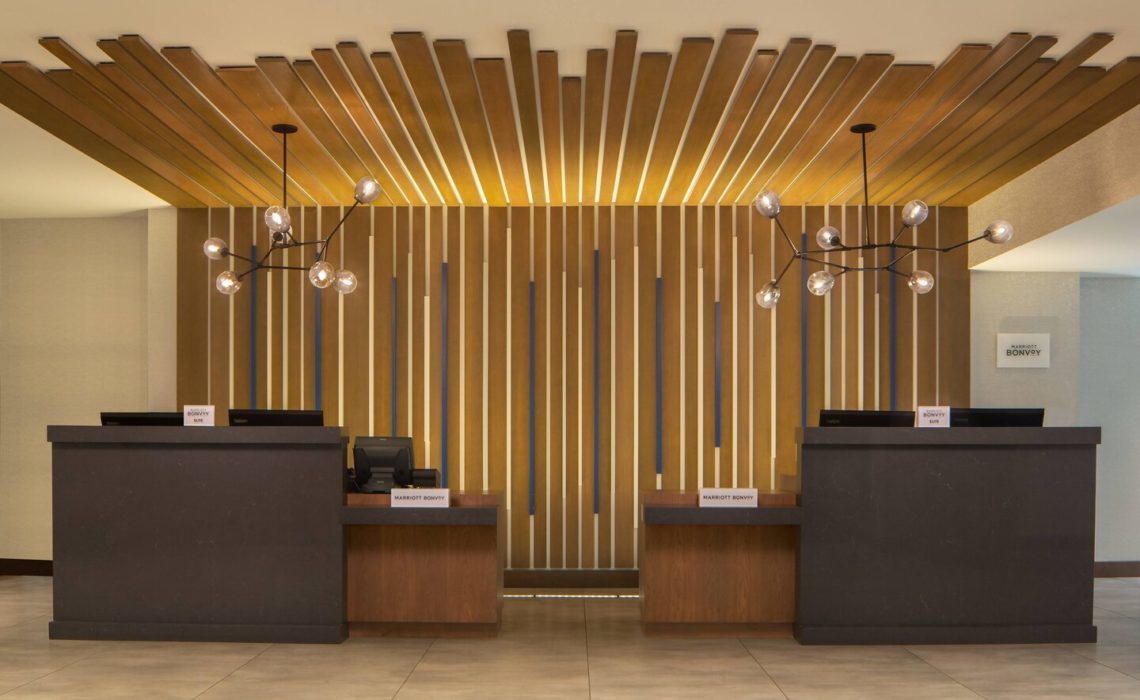Photo via Atlanta Marriott Perimeter Center
Hotel room blocks for weddings are important, especially if you have a lot of guests coming in from out of town for your celebration. They make it easier for guests to secure a place to stay, simplify transportation to the venue, and allow guests to socialize with each other before the big day. Of course, the process of securing wedding guest accommodations is new to most couples. If you’re booking hotel blocks for the first time, here are a few tips to make the process as easy as possible.
Know the Lingo: Closed and Open Blocks
Before going into the process of researching hotels, you should be aware of the different types of blocks you can get. With a closed block, you are contractually bound to a certain number of rooms. If these rooms aren’t filled by your guests, you are responsible for the cost. Typically, you are responsible for a percentage of the cost, and your contract may allow for a small percentage of rooms to go unfilled without a penalty (allowable shrinkage) – but this will vary from hotel to hotel.
With an open block, there is a bit more leeway. You are committed to a number of rooms, and then guests are required to make their reservations by a certain deadline. Once that deadline passes, the rooms are released for sale to the public, and you aren’t held liable for the costs. Open blocks are generally preferred, but closed blocks are useful if you are certain how many rooms will be needed, or if the hotel (and other hotels in the area) will be booked up quickly due to another local event or holiday.
Have an Idea of How Many Rooms You’ll Need
While you don’t need an exact number, you should have an idea of how many rooms you will need before contacting hotels. Take a look at your guest list, and see how many guests will be coming in from out of town. You should also take note of what type of rooms will be needed, such as king or queen-size bedrooms for couples and two-bedrooms for families. This will help you get a pretty clear idea of how many rooms you should expect.
In general, you should aim for the conservative side to avoid fees of not filling up rooms. If your room block ends up getting filled up, you may be able to add more rooms later. Of course, you should check the rules of each individual hotel you are working with.
Reserve as Early as Possible
Once you have your venue nailed down and an idea of how many guests will need accommodations, you’ll want to get working on booking your hotel room blocks as soon as possible. It is particularly important to reserve early if you’re getting married in a town without a lot of accommodation options, on a holiday weekend, or on the weekend of a popular local event (such as a sports event or festival).
Start with Accommodations Close to the Venue
For the sake of ease of transporting to the venue, it is best to pick hotels that are as close to the venue as possible. Make a list of the potential accommodations that are close to your wedding venue, and then work from there. Start contacting the closest hotels to ask about room blocks and availability. If they aren’t available or don’t fit your needs, you can move to options that are a bit further away.
Provide Different Price Points
Chances are not every guest will be able to splurge on five-star accommodations for your wedding. In order to cater to the needs of all guests, be sure to provide hotel options that are suitable for different budgets. Aim for at least two different hotel options, and see if you can get a variety of room types within each hotel.
Negotiate as Needed
When you’re working on your contract with hotels, know that you do have the power to negotiate if you need to. This might mean working out a higher allowable shrinkage (the number of rooms that can go un-booked without being penalized) or asking for perks with your room block, like complimentary breakfast or free parking. When negotiating, be sure you are talking to someone who has the ability to make these adjustments to the contract.
Be Aware of Check-In Times
For the guests coming in on the day of the wedding, it might be an issue if the check-in time is later in the afternoon – they’ll want to drop off their luggage and freshen up before the celebration. If the hotels you are interested in have later check-in times, see if you can negotiate for earlier times for your room blocks to accommodate these guests.
If you are in the process of planning your wedding, come to the next Georgia Bridal Show near you. You will have the chance to meet with professional wedding vendors of all talents who can help bring your vision to life!
Georgia wedding vendors, as well as other wedding professionals across the Southeast, can contact us about opportunities for exhibition and online marketing with Georgia Bridal Show.


